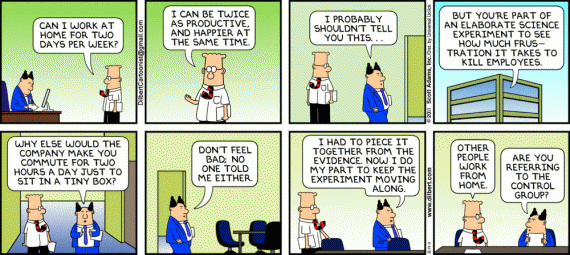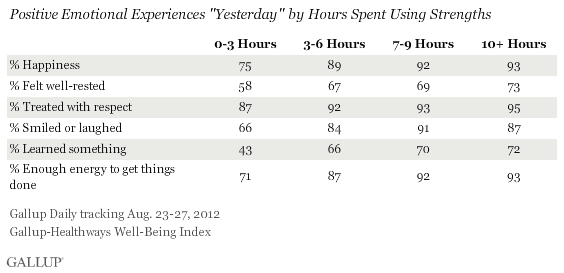Love What You Do: 4 Things That Will Make You Happier At Work
.
Sometimes your job can really be a grind — but quitting isn’t always a realistic option.
So what can you do to become happier with the job you have?
Here are four stories from the latest research that can make your job more meaningful and make you happier at the office.
Change Your Job Description
Cleaning the floors in a hospital isn’t anyone’s dream job. Emptying trash cans in patient rooms doesn’t feel special or important.
But what if you had the same responsibilities and chose to see your work in a broader context?
I’m helping this hospital run better and my work allows these patients to heal and return to their families.
A study did just that — comparing workers who saw their jobs as merely a paycheck versus seeing it as something deeper.
And those who saw their cleaning duties as contributing to the health of the patients felt their jobs were more meaningful.
Via Choose the Life You Want: The Mindful Way to Happiness:
Wrzesniewski and Dutton followed a group of hospital cleaners, and found that some of the cleaners experienced their work as a job — as something they did solely for the paycheck — and described it as boring and meaningless. But another group perceived the same work as a calling — and experienced the hours they spent at work as engaging and meaningful. This second group of hospital cleaners did things differently from the first group. They engaged in more interactions with nurses, patients, and visitors, taking it upon themselves to make everyone they came in contact with feel better. Generally, they saw their work in its broader context: They were not merely cleaning the wards and removing the trash, but were contributing to the health of patients and the smooth functioning of the hospital.
How do you see your job? Is there a better — but still honest — lens to see it through that would make you happier?
(More on meaning in life here.)
See The Results
Working in a call center can be thankless and tedious. What does it take to make people feel good about endless dialing and frequent hang-ups?
Wharton professor Adam Grant did research trying to motivate employees at a university call center.
He was able to create a dramatic increase in motivation without giving raises, promotions, bonuses or spending a dime.
How?
He showed them letters written by grateful students who had received scholarships due to the efforts of the call center team.
What pushed their motivation even higher? Speaking with those students.
Via Give and Take: A Revolutionary Approach to Success:
When callers interacted with one scholarship recipient in person, they were even more energized. The average caller doubled in calls per hour and minutes on the phone per week. By working harder the callers reached more alumni, resulting in 144 percent more alumni donating each week. Even more strikingly, revenue quintupled: callers averaged $412 before meeting the scholarship recipient and more than $2000 afterward.
Are you in a cube cut off from the results of your labor? Is there any way you could better see how your work helps customers?
(More on motivation here.)
Use Your Strengths
You probably do a range of activities at work and some of those duties might be shared with other team members.
Do you have some flexibility over which tasks you handle and which your co-workers cover? If so, you can dramatically improve your happiness.
Don’t pick the tasks that are quick or easy. Offer to do all the things you’re good at.
The research is conclusive: doing what you’re good at is the key to happiness:
Americans also gain a boost in positive emotions the more they use their strengths. The more hours per day adults believe they use their strengths, the more likely they are to report having ample energy, feeling well-rested, being happy, smiling or laughing a lot, learning something interesting, and being treated with respect.

A job that lets you use your talents makes you consistently happier at the office:
The more signature strengths were applied at the workplace, the higher the positive experiences at work. This study showed that character strengths matter in vocational environments irrespective of their content.
Using your strengths daily can make you significantly happier for months.
When 577 volunteers were encouraged to pick one of their signature strengths and use it in a new way each day for a week, they became significantly happier and less depressed than control groups. And these benefits lasted: Even after the experiment was over, their levels of happiness remained heightened a full month later.
What responsibilities that you’re weak at could someone else handle? What could you do that leverages your strengths?
(More on “signature strengths” here.)
Invest Yourself
You can learn a lot about loving your job by looking at IKEA furniture. Seriously.
Why is IKEA furniture so popular? Research shows we love things more when we invest ourselves in them.
You built that Lovbacken side table with your own two hands. It’s your creation.
Behold the mind-bending Svengali power of Swedish furniture.
In my interview with Duke professor Dan Ariely author of Predictably Irrational: The Hidden Forces That Shape Our Decisions he explained:
So this is a great example of something that is irrational but wonderful. And what we’ve basically found is that the moment that you invest something of yourself into something, you start overvaluing it. My personal experience started with IKEA furniture which is the reason that we call it the IKEA effect. But what happened was I’m not particularly good in assembling things and it took me a long time. I made all kinds of mistakes. But I found out that when I finished assembling this truly mediocre piece of furniture, I was actually incredibly proud of it and I kept moving it with me from city-to-city as I would keep on moving, while the objective quality of it did not support that.
If I put a random child in your house and told you to support it, you’d say “No way.”
If it was your kid, you’d support it and more — your happiness would be tied to the child’s well-being.
Being invested in something makes us care more and, as Dan explained, research shows it doesn’t take all that much to get us caring:
And I think this is because kids are an ideal example of the IKEA effect…But the realization I think is we love them so much because they’re our kids. We think that IKEA furniture comes with better instructions. Kids really come with no instructions. Very tough to deal with, difficult, complex, but incredibly involving and time consuming and I think the love that comes out of it is an example of the effect of a tremendous investment.
Invest your time and energy in building that Karlskoga sofa bed and you come away loving it.
The more you do for your kids, the more you want to do for them.
Invest more in your career and you can find yourself loving that too.
Join 45K+ readers. Get a free weekly update via email here.
Related posts:
What 10 things should you do every day to improve your life?
6 hostage negotiation techniques that will get you what you want
8 Things The World’s Most Successful People All Have In Common




